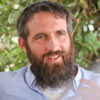“Joining together with our People, and remembering a place and time before we had our own land, we are being called to maintain the sanctity of humanity and creation.” The final parsha in the Torah, V’Zot Habracha, is unique in that it is not read on a regular Shabbat. Rather, this third-shortest parsha, containing only 41 verses, is read on Simchat Torah as part of our celebrations concluding – and immediately restarting – the annual Torah reading cycle. It recounts blessings by Moses to the various tribes of Israel, his death overlooking the Land of Israel (which he was destined not to enter), and the Children of Israel’s mourning for our greatest leader. (This Shabbat’s reading instead focuses on portions related to the Festival of Sukkot). It is actually right now and specifically this year that we are commanded to fulfill a unique and particularly beautiful mitzvah: Hakhel. Parshat Vayelech, which we read two weeks ago, instructs us to gather in Jerusalem during Sukkot following the conclusion of Shmita (Deut. 31:12): Gather the nation: men, women and children and the stranger in your midst, so that they shall hear and so that they shall learn; and be in awe of […]


















